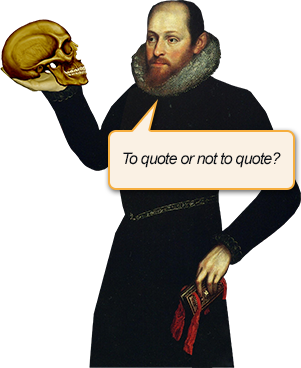Essay Concerning Human Understanding Quotes
Shmoop will make you a better lover...of quotes
ALL QUOTES POPULAR BROWSE BY AUTHOR BROWSE BY SOURCE BROWSE BY TOPIC BROWSE BY SUBJECTSource: Essay Concerning Human Understanding
Author: John Locke
"Let us then suppose the mind to be, as we say, white paper."
Let us then suppose the mind to be, as we say, white paper, void of all characters, without any ideas:—How comes it to be furnished? Whence comes it by that vast store which the busy and boundless fancy of man has painted on it with an almost endless variety? Whence has it all the materials of reason and knowledge? To this I answer, in one word, from experience.
Context
This line was written by John Locke in his "Essay Concerning Human Understanding," which he published anonymously in 1689.
In this essay, John Locke argues against the "a priori" theory of human knowledge, which basically says that human beings are born knowing certain things. Locke instead tries to replace this model with a "tabula rasa," or "white paper," model of the human brain. But that doesn't mean we're all just staring off into space all the time. It means that human beings are born with no real knowledge and gain 100% of everything they know from experience.
As with most of the things he wrote, John Locke's "white paper" model of human understanding would go on to be one of the biggest ideas behind the American Revolution. This Revolution totally rejected the aristocratic idea that some humans are born better than others and used Locke's "clean slate" theory of knowledge to argue for why every single person deserves a fair and equal shot at happiness from the moment they're born. So if you're a king or an aristocrat, you're probably not a fan.
Where you've heard it
If you've spent any time around the hallways of an Arts & Humanities building in college, you've probably heard people arguing about "tabula rasa"—in other words, whether a person is born knowing certain things or not.
The phrase tabula rasa comes straight from Locke's "white paper" model of the mind and has become something that you're going to hear from anyone who has an artsy or philosophical side to them. Indie filmmakers in Indonesia, for example, were happy to make a whole movie named after Locke's concept in 2014. Even J.J. Abrams couldn't help giving the name "tabula rasa" to one of the episodes of his TV series Lost. And if you think that's not enough of a reference, consider the fact that one of the main characters' names is John Locke… bleh.
Pretentious Factor
If you were to drop this quote at a dinner party, would you get an in-unison "awww" or would everyone roll their eyes and never invite you back? Here it is, on a scale of 1-10.

For starters, good luck memorizing the whole thing. And if you do, don't be surprised if people think you sound pretty pretentious. If you want to convey the gist of Locke's point, you might as well say, "We're all blank slates when we're born" or "Everything we know, we learn from experience." Otherwise, people are totally going to know you're quoting some famous philosopher and they'll be rolling their eyes with a vengeance. If you're in the company of professors or academics, though, we say go for it.
